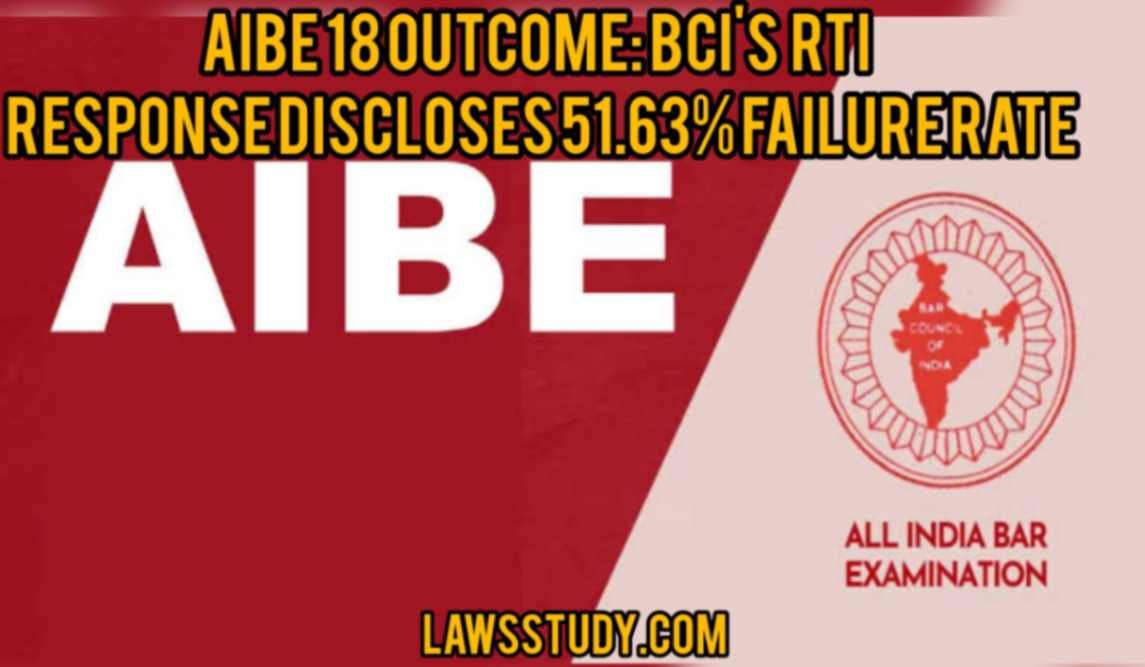AIBE 18 Outcome: BCI’s RTI Response Discloses 51.63% Failure Rate: The All India Bar Examination (AIBE) serves as a pivotal milestone for aspiring lawyers across the nation. Recently, revelations from a Right to Information (RTI) inquiry shed light on the outcomes of AIBE 18, revealing a substantial failure rate of 51.63%. Let’s delve into the details provided by the Bar Council of India (BCI) in response to the RTI plea.
AIBE 18 Examination Statistics
The data disclosed through the RTI application illustrates the scope of AIBE 18. Out of a total of 1,44,014 candidates who participated in the examination, a staggering 74,368 individuals did not meet the passing criteria. Conversely, 69,646 candidates successfully cleared the examination. Notably, this significant failure rate underscores the rigorous nature of the AIBE assessment.
Impact of COVID-19 on Examination Schedule
Traditionally, the AIBE is conducted biannually. However, disruptions induced by the COVID-19 pandemic led to deviations from the regular schedule. The BCI acknowledged these challenges in conducting the examination as per the established timeline. This acknowledgment underscores the unprecedented circumstances that impacted various aspects of academic and professional assessments during the pandemic.
Adjustments in Evaluation Criteria
In response to the RTI inquiry, the BCI detailed adjustments made in the evaluation criteria for AIBE 18. Notably, the decision to withdraw seven questions from the examination prompted recalibration of the passing marks. For General and OBC categories, the passing mark was set at 45% of the adjusted total marks, while for SC, ST, and disabled categories, it was 40%. These adjustments highlight the meticulous consideration given to maintaining fairness and integrity in the evaluation process.
Decision-Making Process
The BCI emphasized the involvement of a high-level monitoring committee in decision-making related to AIBE 18. This committee meticulously reviewed objections raised by candidates before finalizing the evaluation criteria. Subsequently, the decisions were ratified by the council, underscoring a transparent and deliberative approach in ensuring the credibility of the examination process.
Transparency and Accountability
One of the key aspects highlighted in the BCI’s response to the RTI inquiry is the commitment to transparency and accountability. The council provided detailed explanations regarding the adjustments in evaluation criteria, demonstrating a willingness to address concerns raised by stakeholders. Moreover, adherence to established legal frameworks, such as the RTI Act, reflects a commitment to upholding democratic principles and ensuring access to information.
Challenges in Information Disclosure
Despite the comprehensive insights provided by the BCI, certain limitations were evident in the scope of information disclosure. Queries regarding candidates’ individual scores and pass percentages across state bar councils were met with limitations. The BCI cited legal precedents and the RTI Act to justify constraints in providing certain types of information, particularly those requiring inference or assumptions.
Conclusion
In conclusion, the revelations stemming from the RTI inquiry into AIBE 18 shed light on various facets of the examination process. From the challenges posed by the COVID-19 pandemic to the meticulous decision-making involved in evaluation criteria adjustments, the BCI’s response underscores a commitment to transparency and accountability. However, certain limitations in information disclosure highlight the complexities inherent in balancing public access with legal constraints. As AIBE continues to evolve, stakeholders must collaborate to address challenges and uphold the integrity of legal education and assessment.

























